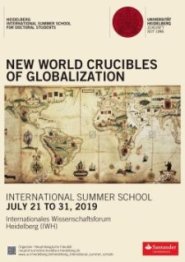New World Crucibles of Globalization
New World Crucibles of Globalization
Date: 21. to 31. July 2019
Venue: Internationales Wissenschaftsforum Heidelberg (IWH)
Twenty outstanding doctoral students from selected universities in Europe and Latin America will be invited to participate in the Heidelberg International Summer School NEW WORLD CRUCIBLES OF GLOBALIZATION. The speakers are scientists from Heidelberg University as well as renowned experts from other European and North & Latin American universities.
The Summer School aims at an archeological description and regionally comparative reflection of two critical phases of globalization in Latin America and its relation to Europe and Asia. A primordial scene of globalization was Hernán Cortés’s landfall in Mexico, half a millennium ago in 1519. It marked the beginning of the incorporation of a populous and highly differentiated civilization into the “Western World”.
Five hundred years after 1519, we reflect on the current phase of globalization in which economic and cultural transformation are intrinsically intertwined. We focus on symbolic imbrications between Latin America, Europe, and Asia, in language, culture, and literature, as well as economic and legal relations:
- How is the experience of crisis represented in terms of language, aesthetics, and media?
- What is the impact of this entangled transatlantic (and transpacific) history on prevalent discourses and the circulation of knowledge?
The aim of the Summer School is to enable doctoral students both to further develop high-level expertise in their specific area of research and to gain an insight into complementary areas. The curriculum will provide lectures and interdisciplinary discussions in the fields of literature & culture, linguistics & language history, global history & economic history. In addition, workshops will be conducted to teach relevant research methods. Doctoral students will have the opportunity to present their own research and will receive feedback from other students and experts.
The scientific coordinators are Prof. Dr. Sybille Große and Prof. Dr. Robert Folger (both from Heidelberg). Invited speakers will include, among others: Prof. Dr. Armin von Bogdandy (Heidelberg), Dr. Anne Brüske (Heidelberg), Dr. Rolando Patricio Carrasco Monsalve (Osnabrück), Luis Castellví Laukamp, Ph.D. (Cambridge, Heidelberg), Prof. Dr. Enrique Dussel (Mexiko), Prof. Dr. Fernando Escalante Gonzalbo (Mexiko), Prof. Dr. Stefanie Gänger (Heidelberg), Prof. Dr. Silke Jansen (Erlangen), Prof. Dr. Nikolas Jaspert (Heidelberg), Prof. Dr. Monica Juneja (Heidelberg), Prof. Dr. Susanne Lachenicht (Bayreuth), Prof. Dr. Günter Leypoldt (Heidelberg), Prof. Dr. Francisco Moreno-Fernández (USA), Dr. Fernando Nina (Heidelberg), Paula C. Park, Ph.D. (Wesleyan, Bielefeld), Prof. Dr. Thomas Sträter (Heidelberg), Prof. Dr. Christiane von Stutterheim (Heidelberg), Prof. Dr. Elvira Vilches (USA), Prof. Dr. Jiang Shixue (China), PD Dr. Jing Xuan (Heidelberg), Prof. Dr. Yang Zhimin (China)
- Monday, July 22, 2019, 19.15, Aula der Alten Universität (Old Lecture Hall): Prof. Dr. Fernando Escalante Gonzalbo, El Colegio de México, on Enlightened blindness. Mexico: a global tragedy:
Prof. Dr. Fernando Escalante Gonzalbo is a Mexican sociologist of wide renown in Mexico and Spain. Escalante received his PhD in Sociology from El Colegio de México, where he is currently a professor of International Relations. He is the author of several books on political theory, historical sociology, and cultural criticism. In Spring 2005, he was the Tinker Visiting Professor in History at the University of Chicago. Escalante Gonzalbo discusses in Historia mínima del neoliberalismo (Brief History of Neoliberalism) the consolidation of neoliberal narrative during the 1970s and onward. He has recently published a Spanish translation of the Walter Lippmann Colloquium proceedings in Así empezó todo. Los orígenes del neoliberalismo (And so it begann. The Origins of Neoliberalism), making this crucial primary source available to a wide, Spanish-speaking audience for the first time. Although in México he is perhaps most well-known for his study of nineteenth-century civic culture, Ciudadanos imaginarios (Imaginary Citizens) and In the Eyes of God: A Study in the Culture of Suffering, books that made his reputation as a highly skilled interpreter of Mexican politics and as preeminent example of a comprehensive approach to the history of ideas. Escalante intervenes frequently in the print and television media of Mexico, and has been widely cited in sociological papers and studies on his views of cultural transformation of Mexico.
- Monday, July 29, 2019, 19.15, HS 14, NUni: Prof. Dr. Enrique Dussel, Universidad Nacional Autónoma de México, on Decolonizing the world history:
Prof. Dr. Enrique Dussel is considered one of the great Latin American thinkers and co-founder of the political liberation philosophy of Latin America. He teaches at the important UNAM University in Mexico. Dussel has developed a theory of modernity that regards modernity not as an origin, but as a consequence of European expansion and globalization. Thus, only the potential of autocorrection inherent in modernity allows the subalterns to exert political influence. This important approach can be discussed both interdisciplinary and diachronic.


